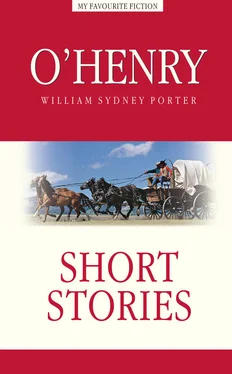Sam Folwell arrived in New York in the night. Still moving and living in the free circles of nature, he did not perceive the formidable, pitiless, restless, fierce angles of the great city waiting in the dark to close about the rotundity of his heart and brain and mould him to the form of its millions of re-shaped victims. A cabby picked him out of the whirl, as Sam himself had often picked a nut from a bed of wind-tossed autumn leaves, and whisked him away to a hotel commensurate to his boots and carpet-sack.
On the next morning the last of the Folwells made his sortie into the city that sheltered the last Harkness. The Colt was thrust beneath his coat and secured by a narrow leather belt; the hunting-knife hung between his shoulder-blades, with the haft an inch below his coat collar. He knew this much – that Cal Harkness drove an express wagon somewhere in that town, and that he, Sam Folwell, had come to kill him. And as he stepped upon the side-walk the red came into his eye and the feud-hate into his heart.
The clamor of the central avenues drew him thitherward. He had half expected to see Cal coming down the street in his shirt-sleeves, with a jug and a whip in his hand, just as he would have seen him in Frankfort or Laurel City. But an hour went by and Cal did not appear. Perhaps he was waiting in ambush, to shoot him from a door or a window. Sam kept a sharp eye on doors and windows for a while.
About noon the city tired of playing with its mouse and suddenly squeezed him with its straight lines.
Sam Folwell stood where two great, rectangular arteries of the city cross. He looked four ways, and saw the world burled from its orbit and reduced by spirit level and tape to an edged and cornered plane. All life moved on tracks, in grooves, accord-ing to system, within boundaries, by rote. The root of life was the cube root; the measure of existence was square measure. People streamed by in straight rows; the horrible din and crash stupefied him.
Sam leaned against the sharp corner of a stone building. Those faces passed him by thousands, and none of them were turned toward him. A sudden foolish fear that he had died and was a spirit, and that they could not see him, seized him. And then the city smote him with loneliness.
A fat man dropped out of the stream and stood a few feet distant, waiting for his car. Sam crept to his side and shouted above the tumult into his ear:
“The Rankinses’ hogs weighed more’n ourn a whole passel, but the mast in thar neighborhood was a fine chance better than what it was down – ”
The fat man moved away unostentatiously, and bought roasted chestnuts to cover his alarm.
Sam felt the need of a drop of mountain dew. Across the street men passed in and out through swinging doors. Brief glimpses could he had of a glistening bar and its bedeckings. The feudist crossed and essayed to enter. Again had Art eliminated the familiar circle. Sam’s hand found no door-knob – it slid, in vain, over a rectangular brass plate and polished oak with nothing even so large as a pin’s head upon which his fingers might close. Abashed, reddened, heartbroken, he walked away from the bootless door and sat upon a step. A locust club tickled him in the ribs.
“Take a walk for yourself,” said the policeman. You’ve been loafing around here long enough.”
At the next corner a shrill whistle sounded in Sam’s ear. He wheeled around and saw a black-browed villain scowling at him over peanuts heaped on a steaming machine. He started across the street. An im-mense engine, running without mules, with the voice of a bull and the smell of a smoky lamp, whizzed past, grazing his knee. A cab-driver bumped him with a hub and explained to him that kind words were invented to be used on other occasions. A motorman clanged his bell wildly and, for once in his life, corroborated a cab-driver. A large lady in a changeable silk waist dug an elbow into his back, and a newsy pensively pelted him with banana rinds, murmuring, “I hate to do it – but if anybody seen me let it pass!”
Cal Harkness, his day’s work over and his express wagon stabled, turned the sharp edge of the build-ing that, by the cheek of architects, is modelled upon a safety razor. Out of the mass of hurrying people his eye picked up, three yards away, the surviving bloody and implacable foe of his kith and kin.
He stopped short and wavered for a moment, being unarmed and sharply surprised. But the keen mountaineer’s eye of Sam Folwell had picked him out.
There was a sudden spring, a ripple in the stream of passersby and the sound of Sam’s voice crying:
“Howdy, Cal! I’m durned glad to see ye.”
And in the angles of Broadway, Fifth Avenue and Twenty-third Street the Cumberland feudists shook hands.
“A trust is its weakest point,” said Jeff Peters.
“That,” said I, “sounds like one of those unintelligible remarks such as, “Why is a policeman?”
“It is not,” said Jeff. “There are no relations between a trust and a policeman. My remark was an epitogram – an axis – a kind of mulct’em in parvo. What it means is that a trust is like an egg, and it is not like an egg. If you want to break an egg you have to do it from the outside. The only way to break up a trust is from the inside. Keep sitting on it until it hatches. Look at the brood of young colleges and libraries that’s chirping and peeping all over the country. Yes, sir, every trust bears in its own bosom the seeds of its destruction like a rooster that crows near a Georgia colored Methodist camp meeting, or a Republican announcing himself a candidate for governor of Texas.”
I asked Jeff, jestingly, if he had ever, during his checkered, plaided, mottled, pied and dappled career, conducted an enterprise of the class to which the word “trust” had been applied. Somewhat to my surprise he acknowledged the corner.
“Once,” said he. “And the state seal of New Jersey never bit into a charter that opened up a solider and safer piece of legitimate octopusing. We had everything in our favor – wind, water, police, nerve, and a clean monopoly of an article indispensable to the public. There wasn’t a trust buster on the globe that could have found a weak spot in our scheme. It made Rockefeller’s little kerosene speculation look like a bucket shop. But we lost out.”
“Some unforeseen opposition came up, I suppose,” I said.
“No, sir, it was just as I said. We were self-curbed. It was a case of auto-suppression. There was a rift within the loot, as Albert Tennyson says.”
You remember I told you that me and Andy Tucker was partners for some years. That man was the most talented conniver at stratagems I ever saw. Whenever he saw a dollar in another man’s hands he took it as a personal grudge, if he couldn’t take it any other way. Andy was educated, too, besides having a lot of useful information. He had acquired a big amount of experience out of books, and could talk for hours on any subject connected with ideas and discourse. He had been in every line of graft from lecturing on Palestine with a lot of magic lantern pictures of the annual Custom-made Clothiers’ Association convention at Atlantic City to flooding Connecticut with bogus wood alcohol distilled from nutmegs.
One Spring me and Andy had been over in Mexico on a flying trip during which a Philadelphia capitalist had paid us $2,500 for a half interest in a silver mine in Chihuahua. Oh, yes, the mine was all right. The other half interest must have been worth two or three thousand. I often wondered who owned that mine.
In coming back to the United States me and Andy stubbed our toes against a little town in Texas on the bank of the Rio Grande. The name of it was Bird City; but it wasn’t. The town had about 2,000 inhabitants, mostly men. I figured out that their principal means of existence was in living close to tall chaparral. Some of ’em were stockmen and some gamblers and some horse peculators and plenty were in the smuggling line. Me and Andy put up at a hotel that was built like something between a roof-garden and a sectional bookcase. It began to rain the day we got there. As the saying is, Juniper Aquarius was sure turning on the water plugs on Mount Amphibious.
Читать дальше
Конец ознакомительного отрывка
Купить книгу












